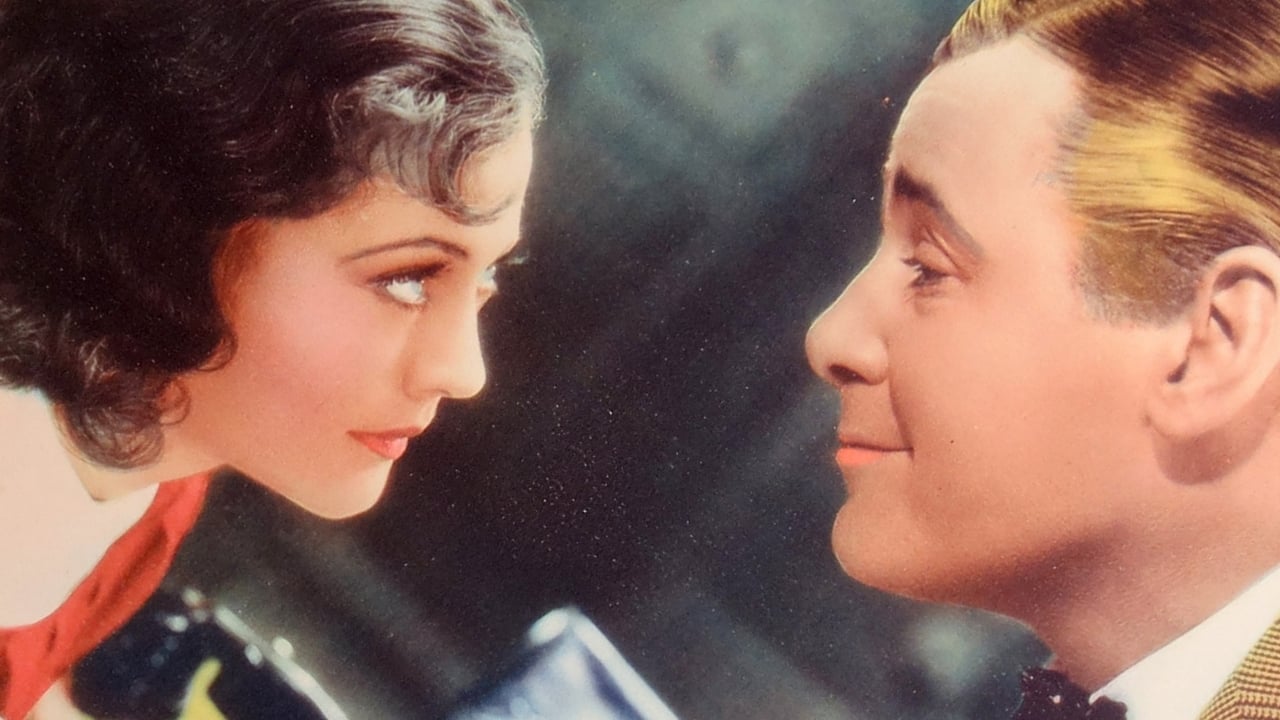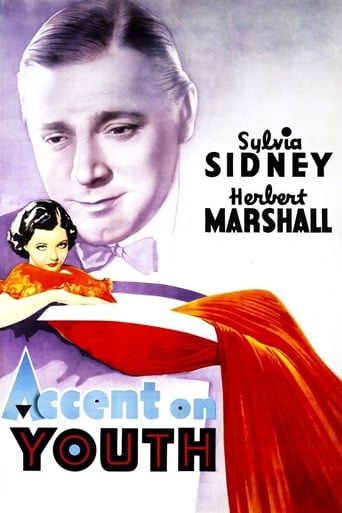

Herbert Marshsal could carry a script and Sylvia Sidney could stop a train with her eyes. Well written and well acted.
... View MoreSteven Gaye (Herbert Marshall) is a famous playwright who has just written a play about a May-December romance. However, as he works on the story, real life begins to intrude as the actress starring as the young lady in love with the older man, Linda (Sylvia Sidney), begins to actually fall in love with Steve. But Steve is a practical man and sees little future in this and encourages a young beau to pursue her as well. Sadly, when Steve and Linda get what they want, they don't seem to want it any more. What exactly does this mean? See the film.This is a mildly enjoyable old film that surprised me. The ending seems pretty much in line with Pre-Code sensibilities...so imagine my surprise when it turns out to be a Production Code movie...coming out the year following the implementation of the tough Production Code. Worth seeing and quite interesting, mostly because Marshall is great in most anything.
... View MoreIt's hard to know what to make of "Accent on Youth". So many things happen in it that just seem odd to to the point of implausible.The basic plot is that:1. Secretary Linda is in love with her older boss, playwright Steven, who has been oblivious to her feelings. 2. An old girlfriend suddenly appears, Steven decides to retire and go off with her to Finland 3. He discharges Linda, who then declares her love for him. 4. Suddenly Steven un-retires and hires Linda to star in his new play. (No mention of how his old girlfriend takes this).Confused? That's only the start of this weird journey. The script ranges from melodrama through romance to sheer wincing awkwardness. It's at times arch, at other times pretentious, at other times simply implausible. "Hey! Let me look at you! Linda, you're strange, grand, lovely. No, no, no, don't go away. Let me look at you some more!" Even the legendary velvet tones of Herbert Marshall can't de-cringe this.Linda does the play. Then there's another mix-up, where Steven thinks young actor Dickie is involved with her. He storms home, Linda storms to his place, they have a row, and then they make up. They decide to get married. Perfect. Had the film ended here, it might have been reasonably pleasant and plausible.But wait, there's more...Dickie pops around and whinges to Steven. Steven clears out, Linda comes round, and in a few minutes is kissing Dickie passionately (bear in mind she's had every chance to do so before) and then marries him rather than Steven. What follows is a bizarre honeymoon where he spends all his time trying to get her to exercise, accompanied by his two friends. Although maybe there's a really obvious subtext here that I missed? There were presumably more than a few Hollywood marriages where the groom's "close friend" popped along for the ride.Anyway, Linda flees back to Steven and they end up together. Again. For what appears to be the third time in this bizarre story.Don't get me wrong, I loved this movie for all its absurdity. It has endless dialogue from Herbert Marshall for starters, which makes anything watchable/listenable.It's just hard to know how to take it. Bonus observation: the kissing by Herbert Marshall AWFUL, when kissing either Sylvia Sidney or Astrid Allwyn. (Sylvia does just fine with Phillip Reed/Dickie). I realise the Hay's Code had likely kicked in by the time this movie was released, but seriously. Check out the embrace about thirteen minutes in. "How was it?" Herbert Marshall asks. "Not bad!" Astrid Allwyn replies. No, Astrid. It was bad. It was very very very bad. Be glad you didn't end up going to Finland with him.
... View MorePlaywright Steven Gaye (Herbert Marshall) puts great emphasis on youth. You see, there is something "grand" about being young, so grand that all youth deserve to experience young love. Thus, he spends the whole of the film debating with himself about the propriety, apparent unseemliness, and selfishness of a fifty-year-old man falling in love with a woman in her twenties. But Linda (Sylvia Sidney) enlightens him. What if woman chases man rather than man chasing woman? In that case, a May-December affair is okay, at least for a play. You'll see that in his personal life, Steven feels differently and thus tries to spare Linda the mistake of latching onto him when she is "so darn young." Thus, we get the obligatory improbable romance between Linda and a young man who really isn't much to her (or probably any woman's) liking. Although it's 1935, Linda isn't forced to remain with this overbearing man to prove she is good. Happily, the writers knew irreconcilable differences when they saw them and thought, perhaps an unorthodox pairing really is best for some! The film is aided by consistent touches which show that it does not take itself too seriously: Ernest Cossart as the butler is every bit as much Marshall's friend as his servant. Strictly speaking, he remains very proper ("very good sir"), but his familiarity with his master and his decidedly knowing character make his conduct seem almost as if he is mocking propriety itself. Another help is Marshall's ability to effortlessly play the sophisticate, a man who never says anything wrong and who you are likely to find wearing a bow tie, even under his robe. This is a slice of the upper crust, but here, etiquette is matched by personality.
... View More